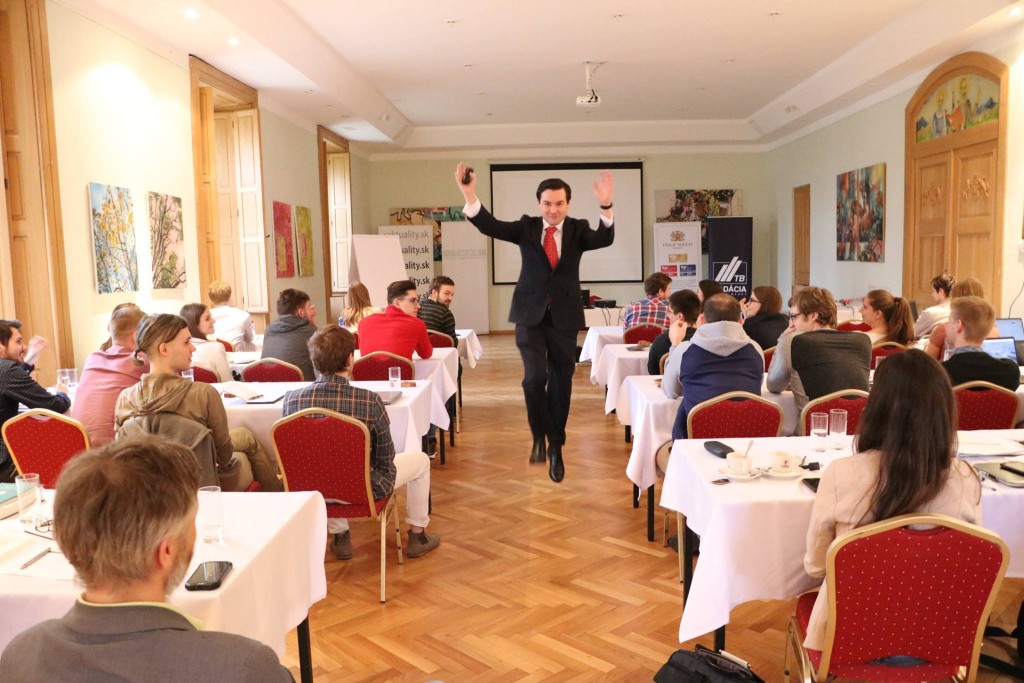The eighth year of the Seminar on Austrian Economics organized by INESS was traditionally held in the Mojmírovce manor on March 15 to 18, 2018. Here, 29 students from various universities from all around Slovakia and the Czech Republic got together.
The first evening started with a short welcoming economic quiz held by the organizers from INESS, where the participants in teams of four sought answers to the questions about economic history, there were analytical tasks but also answering less serious questions, such as ‘Who is the most attractive Nobel Prize winner in the field of economics?’ The quiz was followed by a short introduction of the participants and an informal discussion with the lecturers in the manor’s saloon, which lasted until late night hours.
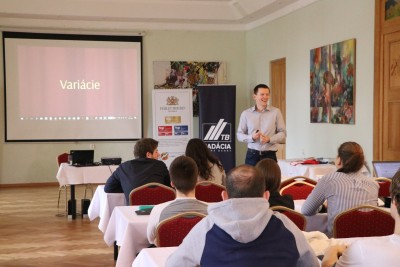 We opened Friday’s program with a short exercise, which allowed the participants to get to know each other a little bit closer. Then, the first lecture entitled ‘The basic income doesn’t solve basic problems’ followed. In this lecture, Radovan Ďurana (INESS) introduced the concept of the basic income, its functioning forms and the ideologies standing behind this idea. Radovan then compared the views of both left and right wing economists on the basic income and presented several arguments both for and against the idea. He also noted that the system of social benefits in Slovakia, which is already providing certain forms of unconditioned income, e.g. child support, is fairly strict towards the country’s poorest citizens.
We opened Friday’s program with a short exercise, which allowed the participants to get to know each other a little bit closer. Then, the first lecture entitled ‘The basic income doesn’t solve basic problems’ followed. In this lecture, Radovan Ďurana (INESS) introduced the concept of the basic income, its functioning forms and the ideologies standing behind this idea. Radovan then compared the views of both left and right wing economists on the basic income and presented several arguments both for and against the idea. He also noted that the system of social benefits in Slovakia, which is already providing certain forms of unconditioned income, e.g. child support, is fairly strict towards the country’s poorest citizens.
The second lecture was led by the main speaker at SREK, professor Edward Stringham (Trinity College, US). In his lecture, professor Stringham introduced the participants to the Austrian School of Economics, its main representatives and their basic ideas. Prof. Stringham also presented the theoretical principles of Austrian Economics, such as the subjective theory of value, its connection to classical economics, and he also mentioned several literary titles that would enable the attendees to understand the principles of The Austrian Economics, should they be interested to get a more detailed picture.
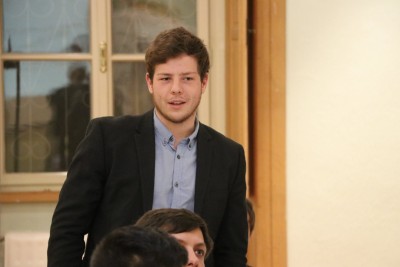 In the afternoon, the seminar continued by tackling the topic of natural resources and the problematic of their (un)limitedness. Martin Vlachynský (INESS) named his lecture ‘Dead pandas don’t cry’ and explained in the beginning that many areas of nature protection and preservation are in fact questions of preferences or moral setting of people. If we faced a choice between building a hospital and preserving a rainforest, it would mean a conflict between the preferences of two groups of people, and it is difficult to say who should have the right to decide on such matter. Martin raised some concern about exhaustibility of natural resources, but he also pointed out that the consumer demand is not for the resources themselves, but for the energy, or the products which can be made from them.
In the afternoon, the seminar continued by tackling the topic of natural resources and the problematic of their (un)limitedness. Martin Vlachynský (INESS) named his lecture ‘Dead pandas don’t cry’ and explained in the beginning that many areas of nature protection and preservation are in fact questions of preferences or moral setting of people. If we faced a choice between building a hospital and preserving a rainforest, it would mean a conflict between the preferences of two groups of people, and it is difficult to say who should have the right to decide on such matter. Martin raised some concern about exhaustibility of natural resources, but he also pointed out that the consumer demand is not for the resources themselves, but for the energy, or the products which can be made from them.
In the next session, we continued our focus on the topic of the sharing economy which caused a radical revolution in the usage of capital and necessity for a revision of the regulatory framework in areas such as transportation or accommodation services. Dr. Róbert Chovanculiak (INESS) began with a thought on how the spare seats in cars could be used. It is the sharing economy which allows us to revive the dead capital in form of an unused car, space, or tools by sharing them with other people who need to use them at the given moment.
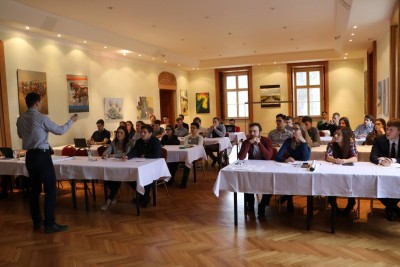 The next in line was a lecture on ‘What you always wanted to know about economics but were afraid to ask’ by Dr. David Lipka, the vice-chancellor of Anglo-American University in Prague. In his presentation, he spoke about the creation of social order which would solve clashes of various opinions and preferences. In the society, there are different formulas for decision-making than in the army, in a family or in a state, which makes it extremely difficult to create rules that could be applied universally. Dr. Lipka illustrated the complexity of social order by the story named ‘I, pencil,‘ describing the creation of a common pencil as a process containing a humongous number of uncontrolled interactions.
The next in line was a lecture on ‘What you always wanted to know about economics but were afraid to ask’ by Dr. David Lipka, the vice-chancellor of Anglo-American University in Prague. In his presentation, he spoke about the creation of social order which would solve clashes of various opinions and preferences. In the society, there are different formulas for decision-making than in the army, in a family or in a state, which makes it extremely difficult to create rules that could be applied universally. Dr. Lipka illustrated the complexity of social order by the story named ‘I, pencil,‘ describing the creation of a common pencil as a process containing a humongous number of uncontrolled interactions.
Saturday at SREK was opened again by Dr. Lipka, this time addressing the topic of ‘Liberalism and its enemies.‘ In his lecture, he compared socialism and liberalism and warned that power in socialism tends to be used as a dangerous privilege. He noted the examples of reigns like the one of Mao Zedong in China when the dictatorial regime persuaded its citizens that the famine was caused by sparrows. He later continued by comparing politics with business, in the sense that their cores originate from different assumptions and traits and are, therefore, oftentimes in dispute.
Professor Stringham continued with the morning program. This time, he dedicated his lecture to the topic of public goods and possibilities for their private provision. He began with a simple definition of externalities, which are given as one of the examples why the state should interfere with the economy. He also pointed out the problems of state interference in cases when the government does not have enough information in order to find a fitting solution for a great number of people with individual preferences. The lecture also described privately governed residential areas, where the ‘typically public goods,‘e.g. street lights, are privately provided and simply added towards the residents‘ utility bills.
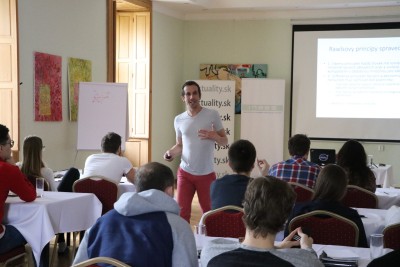 The afternoon at SREK continued with another lecture by professor Stringham. He talked about the ways to requisition obeying of contracts where the rules of private suppliers of services apply. Companies like eBay must carefully evaluate the costs and returns for their own rules in order to maintain the willingness of their customers to use their services. In this way, the customers force the companies to seek the best available solutions. Stringham proclaimed the company’s reputation to be the key factor in requisitioning of contracts. To illustrate his argument, he named many cases when private companies created systems of licensing which, due to their good reputation, are generally accepted.
The afternoon at SREK continued with another lecture by professor Stringham. He talked about the ways to requisition obeying of contracts where the rules of private suppliers of services apply. Companies like eBay must carefully evaluate the costs and returns for their own rules in order to maintain the willingness of their customers to use their services. In this way, the customers force the companies to seek the best available solutions. Stringham proclaimed the company’s reputation to be the key factor in requisitioning of contracts. To illustrate his argument, he named many cases when private companies created systems of licensing which, due to their good reputation, are generally accepted.
In the late afternoon, the participants were busy discussing monetary policy and cryptocurrencies. Juraj Karpiš (INESS) described the process of the evolution of money, from its very beginnings when various shells served as the means of exchange, to their later replacement by gold, or other noble metals. He described the transition from the representative to fiat money and its connection to the financial crisis. In his conclusion, he turned to the topic of cryptocurrencies, the blockchain technology, and their benefit for the future of the financial system.
Ethical hacker Juraj Bednár (Citadelo) joined us after dinner. At the moment, Juraj is devoted to the establishment of Paralelná Polis in Bratislava. In his presentation, focusing on the concept of Paralelná Polis which is already operating in Prague, he introduced the crew and the activities hidden behind this brand.
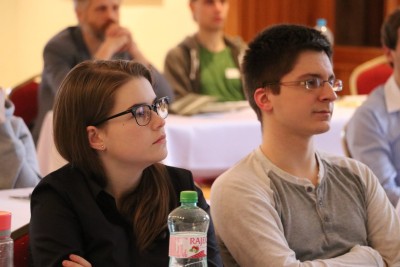 The Sunday morning has begun with the topic of intellectual property. In his lecture, Dr. Richard Ďurana (INESS) challenged the benefits of patents for the innovation process. He pointed out that many inventions are created at the very same time (from the ancient times onwards, there hasn’t been practically any new invention without several inventors behind it) and the patents are awarded to the person who’s the first to run to the patent agency. Dr. Ďurana also addressed the negative cases of patents not serving as means of protection for the inventors, but as forms of monopolies and rent-seeking.
The Sunday morning has begun with the topic of intellectual property. In his lecture, Dr. Richard Ďurana (INESS) challenged the benefits of patents for the innovation process. He pointed out that many inventions are created at the very same time (from the ancient times onwards, there hasn’t been practically any new invention without several inventors behind it) and the patents are awarded to the person who’s the first to run to the patent agency. Dr. Ďurana also addressed the negative cases of patents not serving as means of protection for the inventors, but as forms of monopolies and rent-seeking.
The final lecture was led by Dr. Lipka, who dedicated it to the moral questions in economics. He mentioned an example of closing down a factory, which in the eyes of an economist is beneficial for the society, but the people who worked there for many years can perceive this step as unfair and cruel. In the clash of these opinions, it is difficult to separate logic and emotions. Lipka cited the work of Adam Smith – The Theory of Moral Sentiments, where Smith says that every human is born with feelings which leads them to act in a certain way. It is the very “person in our chest”,’ who leads us see the situations in life with the eyes of others influences our decision-making. This also explains why do we sometimes act illogically.
After the final joint lunch, we followed up with the closing ceremony, where the participants were awarded their certificates of successful completion of the seminar. Each participant received a gift bag of quality economic literature and other study materials.
At the very end, Pavol Fukatsch and Marianna Sádecká introduced the student organization Slovak Students for Liberty and the opportunities to join in their activities. We would like to thank our sponsors: Nadácia Tatra Banky, Philip Morris Slovakia, and Komunitna Nadácia Bratislava for their support. Another big thanks goes to our media partners Aktuality.sk and Startitup.
Translated by Laura Linkeschová



